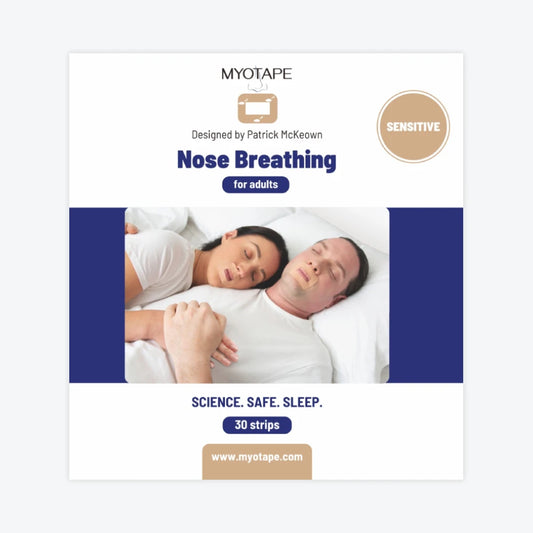This World Mental Health Day, we’re reminded to slow down and care for our minds, but sometimes the smallest habits make the biggest difference. One of those habits is how we breathe.
You might not think much about how you breathe, as it just happens. Yet the truth is that your breath quietly shapes your emotional state, focus, and overall well-being.
Many people are beginning to notice that breathing through the nose, rather than the mouth, offers life-changing benefits, especially mentally.
However, understanding how breathing affects mental health can open the door to a calmer mind and steadier emotions. In this article, you’ll find out how nose breathing benefits your mental health. But first, what role does breathing play in mental health?
Why Breathing Plays a Role in Mental Health
In the busyness of modern life, many of us live in a constant state of low-level stress. Our minds are busy, our bodies are tense, and our breathing often follows suit, becoming shallow, fast, heavy, and often through the mouth.
When we’re stressed, it’s normal for our heart rate and breathing to increase; this is the body’s natural “fight or flight” response. But when stress becomes chronic, this heightened breathing pattern can persist even when we’re at rest.
Over time, it can disrupt the balance of oxygen and carbon dioxide in the body, leaving us feeling anxious, tense, or mentally foggy.
In contrast, slow, light, nose breathing naturally supports the body’s “rest and digest” response, the state where we feel calm, focused, and emotionally steady.
It helps the body slow down, the mind settle, and the nervous system return to a state of balance. This shift can make a real difference in our mental wellbeing.
Now, let us see how nose breathing can improve your mental health.
5 Benefits of Nose Breathing for Mental Health
Below are the amazing ways nasal breathing can boost your mental wellbeing:
1. Calms the mind and reduces anxiety
Nose breathing is one of the simplest ways to calm the mind and ease anxiety, unlike mouth breathing, which is often associated with a faster and heavier breathing pattern.
It naturally slows the breath, helping the body shift from the “fight or flight” state into the “rest and digest” mode, where relaxation and recovery take place.
This gentle rhythm signals safety to the brain, allowing tension to ease and thoughts to settle.
Additionally, by slowly breathing through the nose, the vagus nerve is stimulated, which activates the parasympathetic nervous system and lowers heart rate and stress hormones.
This helps the body move out of a state of alertness and into one of calm and balance.
2. Boosts focus and mental clarity
Clear breathing supports a clear mind. When the nose is blocked or breathing shifts to the mouth, oxygen and carbon dioxide levels in the body can become imbalanced.
This affects how efficiently oxygen is delivered to the brain, resulting in fatigue and impaired concentration.
A 2018 study found that 90% of individuals with nasal obstruction reported difficulty concentrating. After their nasal passages were cleared, participants showed significant improvements in focus and cognitive performance.
Learning how to focus on nose breathing throughout the day can help maintain steady energy and sharper concentration. In contrast, habitual mouth breathing affects your focus and concentration.
3. Builds emotional balance and stress resilience
Emotional stress often leads to shallow mouth breathing, keeping the body in a constant state of alertness. This activates the sympathetic nervous system and raises stress hormones, making it harder to relax or recover.
Slow breathing through the nose helps activate the parasympathetic nervous system, which slows the heart rate and calms the mind.
It also stimulates the vagus nerve, improving heart rate variability (HRV), a key sign of emotional stability and stress resilience.
A 2018 review found that slow nasal breathing increases HRV and supports brain areas linked to emotional control and relaxation.
Regular nasal breathing helps the body handle stress more effectively and promotes a steady, balanced mood.
4. Lifts mood and supports positive thinking
Nasal breathing may also play a role in supporting emotional balance by influencing how the body regulates key neurotransmitters that affect mood and relaxation.
Through its connection with the vagus nerve, gentle nasal breathing may help the nervous system maintain a calmer, steadier state.
Research suggests that neurotransmitters like GABA, acetylcholine, and serotonin are involved in this process, each contributing to relaxation, stress reduction, and emotional stability.
Practices that encourage slow, steady breathing through the nose may help create the conditions for these natural processes to work more efficiently.

5. Improves sleep quality
Sleep is the foundation of good mental health, and steady, proper breathing at night supports better sleep overall.
Mouth breathing is faster and shallower than nasal breathing, making it even harder to sleep. A 2017 study found that rapid breathing can trigger brain arousal linked to nighttime awakenings and insomnia.
Studies also show that nasal obstruction often leads to mouth breathing, snoring, and even sleep apnea, all of which can fragment sleep and affect mood and focus.
However, during sleep, the jaw relaxes, and the nasal passages can narrow, making it easier to slip into mouth breathing, which dries the airways and disrupts oxygen balance.
To support consistent nasal breathing as you sleep, MyoTape can gently keep the lips closed, helping maintain clear nasal airflow, promoting restorative and deeper sleep.
In addition, practicing calm breathing exercises before bed and focusing on nasal breathing through the night can strengthen your mental wellbeing. Doing this will also make nose breathing easier.
Breathe Better, Feel Better — With MyoTape
Your breath is one of the simplest tools for better mental health, and nasal breathing helps you use it to its full potential.
MyoTape makes it easier to stay consistent. Designed by breathing expert Patrick McKeown, it gently supports the lips to stay together without sealing them shut, helping you maintain nasal breathing day and while asleep at night.
It’s comfortable, hypoallergenic, and available for everyone, including mouth tape for kids, mouth tape for adults, mouth tape for sensitive skin, and mouth tape for beards. Visit the MyoTape online shop to get one now!








